- Home
- Chris Wraight
Blood of Asaheim
Blood of Asaheim Read online
It is the 41st millennium. For more than a hundred centuries the Emperor has sat immobile on the Golden Throne of Earth. He is the master of mankind by the will of the gods, and master of a million worlds by the might of his inexhaustible armies. He is a rotting carcass writhing invisibly with power from the Dark Age of Technology. He is the Carrion Lord of the Imperium for whom a thousand souls are sacrificed every day, so that he may never truly die.
Yet even in his deathless state, the Emperor continues his eternal vigilance. Mighty battlefleets cross the daemon-infested miasma of the warp, the only route between distant stars, their way lit by the Astronomican, the psychic manifestation of the Emperor’s will. Vast armies give battle in His name on uncounted worlds. Greatest amongst his soldiers are the Adeptus Astartes, the Space Marines, bio-engineered super-warriors. Their comrades in arms are legion: the Imperial Guard and countless Planetary Defence Forces, the ever-vigilant Inquisition and the tech-priests of the Adeptus Mechanicus to name only a few. But for all their multitudes, they are barely enough to hold off the ever present threat from aliens, heretics, mutants - and worse.
To be a man in such times is to be one amongst untold billions. It is to live in the cruellest and most bloody regime imaginable. These are the tales of those times. Forget the power of technology and science, for so much has been forgotten, never to be re-learned. Forget the promise of progress and understanding, for in the grim dark future there is only war. There is no peace amongst the stars, only an eternity of carnage and slaughter, and the laughter of thirsting gods.
‘You will be faster than they are, stronger, quicker to sense corruption and with full sanction to destroy it. You will be girded in the armour of gods and carry the blades of ruin. You will never age, never wither, never weary. And yet, in all of this, what remains your greatest gift?
‘Only this: while you are a brotherhood, you are unbreakable. While you form the shieldwall, guarding your pack-mates as if they were your own kin-blood, you cannot be resisted. Solely by treachery can this power be undone, as we have learned. We emerge from the lesson stronger, tempered by the knowledge of how low our species can sink. We now know what waits for us should we fail, and that is well, for it is better to know your enemy’s face than for it to remain hidden by shadow.
‘Never forget this. When night comes again, as it surely will, only your brotherhood will protect you. Preserve it, and you will endure. Let it fracture, let it fail, and I tell you truly: our time, humanity’s time, will be over.’
The primarch Leman Russ
Words recorded on Ialis III, c.170.M31
Incorporated into Liber Malan; source-data lost
‘The Wolves of Fenris? They will tire at the end. We will all tire at the end. What else is there, once war is eternal, but fatigue?’
Attributed to the primarch Mortarion
Quoted in Liber Infestus
Date and source unknown
Prologue
Blood rose in his gorge, foaming and flecked with bone, spilling from split lips and over cracked fangs. He stumbled down the walkway, feeling metal struts flex and snap under his limping tread. Gunfire, tinny and echoing, rang down from the airways above him. The noise was an irrelevance by then – a cluttered fury that signified nothing but the slow death of the drifting Arjute-class heavy troop conveyer. The Imperium would not miss it; it could spare a million of them and never notice.
He coughed up more blood, feeling the flesh of his throat constrict. He tried to smile, and the corner of his mouth ripped where the burns latticed against softer flesh.
It would miss him. The Imperium would miss Hjortur Ageir Hvat Bloodfang, Wolf Guard of Fenris, vaerangi of Berek Thunderfist: blood-shedder, beast-slayer, tale-teller. Sagas would mark his passing, declaimed in the icy vaults of home by skjalds who had feared and loved him, just as all in the Rout had feared and loved him.
He started to chuckle as he limped, and blood bubbled down his chin and into his clumped and matted beard.
He’d caused hell. He’d done some damage. He’d do some more before they brought him down, too. Blood of Russ, he’d make them all bleed a little more.
He stumbled, falling to his knees and feeling the mesh of the metal floor grate against his fractured poleyn-guard. He heard his breathing scrape and wheeze within the flickering mess of his helm’s interior.
Above him the roof was a jumbled mass of burned-out pipelines, hanging like vines from the darkness. Somewhere up ahead a red light rotated in rhythm with a superfluous warning klaxon. He heard crashes from further back, further down: the resounding clang of iron-edged boots against metal, the hard clunk of magazines being loaded.
Hjortur pushed himself back to his feet. The enclosed corridor ran away from him, plunging down steeply, winding into the bowels of the conveyer’s enginarium. The metal around him was hot. He staggered along it, reeling from the walls, breaking off shards of steel as his armour snagged against them. He felt enclosed, hemmed in, cornered.
He sensed a movement – twenty metres behind, stealthy like the others had been.
Not stealthy enough.
Hjortur twisted at the waist and squeezed a round away, watching the projectile streak off into the dark through blood-screened eyes. He couldn’t make out his victim but heard the sounds of his death: the crack of breaking armour, the wet schlick of flesh parting, the stifled boom of detonation.
No screams. The hunters that closed on him didn’t scream. He didn’t know what they were. Human, perhaps. If so, they were heavily augmented and stuffed with bionics, for they moved liked he did and hit almost as hard. That was worrying. It shouldn’t have been possible.
He started to limp off again, and the bestial phlegm-growl of his broken breathing hummed in his ears. His retinal display screamed at him, detailing pedantically just how badly he’d been torn up: two lungs gone, chest cavity flooded, seventy minor fractures and six big ones. His skin was a mess of partly-clotted plasma and slowly knitting tissue, all seething with a contradictory mix of stimms and pain suppressors.
Pretty bad. He was breaking up, just like the ship around him.
He heard more footsteps clattering down the corridor, then silence as the hunters crouched down into firing positions. He broke into a sprint, wincing as lances of white-hot pain shot up his shattered shins.
A second later and the corridor filled with solid rounds, crashing and cracking from the walls and filling the narrow space with spinning clouds of metal. He felt the heavy bang of projectiles thudding into his back, tearing fresh gouges in the weakened ceramite and burrowing down towards the flesh beneath.
He reached a T-junction and threw himself around the corner into cover, clanking against the floor and panting, waiting for the hail of fire to break off.
The junction was dark. The air tasted of engine oil and ship-bilge. He could hardly see five paces into the murk. When he blinked, blood cascaded down his cheeks.
The gunfire ceased. He waited two more seconds, enough for the first of them to get up and run down the corridor after him. He could smell them coming, sense their unfamiliar odour even over the stinking melange of the lower decks.
What are you? What kind of creatures are you?
As the first one approached he burst back to his feet, powering his huge, ravaged body into motion, swinging round into the corridor he’d just run down and flexing his claw-hand to gouge.
His pursuer skidded to a halt, suddenly confronted by a vast armoured behemoth rearing up out of the oily shadows. The hunter tried to scramble backwards, but his momentum carried him into lethal range.
Hjortur lashed out with his claws. Their disruptor field had long since b
urned out, but the dented blades still punched through the hunter’s armour, skewering him. Hjortur lashed out, churning up the hunter’s ribcage and flinging him hard against the nearside wall. The hunter’s torso broke open into a flailing ball of skin-scraps and sinew.
Another one was too close. The hunter scrambled back out of claw-range, his black limbs skittering on the metal like an insect’s.
Hjortur pounced, slicing his claw down and dragging the hunter back. The impaled warrior tried to turn, tried to get a weapon hand into position, but it was all far too slow.
Hjortur crashed his other fist down, mashing the hunter’s helm, visor and skull into a glass-flecked soup of pulp. Blood splashed up along Hjortur’s forearms, adding to the riot of streaks and stains already there.
He felt solid rounds crack against his armour again – one, two, three direct hits, rocking him backwards. A shot slammed between the gaping cracks in his breastplate, punching through flesh, grinding into the bone beneath.
Hjortur growled as he swung round, searching for a target in the dark, blinking to clear his vision of blood.
The first he knew of the frag grenade was a gentle tink-tink-tink as it bounced down the corridor.
If his senses hadn’t been crushed, he’d have spotted it sooner. If his muscles hadn’t been ripped apart, he’d have been able to leap clear in time. If his armour hadn’t been carved open, he’d have withstood the blast.
It exploded. The blast-wave hurled him backwards, throwing him onto his back and sending him skidding into the far wall of the junction.
Hjortur’s head bounced back savagely, prompting fresh spikes of pain from his twisted neck. He felt more sharp pops from within, the hot flush of fluids sluicing across his organs. A wave of sickly dizziness swept over him, and his hands went cold. He felt his bolter drop from numb fingers.
Blinded, reeling, he tried to push himself up. He dimly made out the silhouettes of more figures standing above him. He swung his fist clumsily at the nearest. A blade shot out from over to his left, severing his arm at the wrist. Hjortur felt the metal slide under his splintered forearm-guard, slicing agonisingly through what remained of his claw-hand.
More blades flashed in the gloom, plunging into his body, pinioning him to the metal deck. His back arched as they stabbed him, and a ragged, throaty gurgle of pain escaped his mouth.
The hunters kept up the assault. They worked as a team, moving sword-edges quickly, as if panicked by the thought that he might – still – get up. They locked his ankles down. They ran gouges along his torso, exposing glistening viscera. They threw chains across his legs and throat, yanking his head back against the floor.
By the time they had finished, Hjortur Ageir Hvat Bloodfang, Wolf Guard of Fenris, vaerangi of Berek Thunderfist, lay impaled on the lower decks of the Arjute-class heavy troop conveyer like an insect pinned to a collector’s card. Twelve short swords held him in place, six adamantium-link chain-lengths held him down, seven barbed gouges were lodged in his chest, each one standing at the head of the gushing fountain of thick, semi-clotted blood.
That was what it took to subdue him. Hjortur coughed up a wet, grim snort of satisfaction. He’d extracted his tally of pain.
How many hunters had he killed? Maybe a hundred. This had been a serious operation. They had come prepared.
The blurred black-clad figures withdrew. Hjortur tried to raise his head, but the chains pulled tight. His breath came in tight, short gasps. He could feel his armour systems gutter and fizz out. He could feel his body getting colder, shutting down, giving up the ghost.
Giving up the ghost. Hjortur felt delirious. Giving up the ghost.
A single hunter remained, hanging over his face like a vision in smoke. He could make out the fuzzy outline of a closed-face helm. He saw a cherubic device printed on the forehead – golden, spike-crowned against a sable ground. He saw plates of armour glinting, matt-black and rimmed with silver. He smelled the sooty aroma of a cooling weapon muzzle, and heard the faint whine of a power-pack winding down.
The world around him began to melt away. He concentrated, determined to look at his killer, right up to the end.
Fenrys.
The thought swam into his mind unbidden. He saw an image of the peaks of Asaheim, vast and snow-streaked, picked out in hard lines of frosty clarity. He knew then that he would never go back to them, never feel their knife-sharp air sting on his tongue. That knowledge pained him more than his hundred wounds.
The blurred figure swung closer, kneeling beside Hjortur and peering down at him. Hjortur saw his own face reflected darkly in a glassy visor, and barely recognised himself.
They will replace me, he thought. The pack needs a leader.
The hunter withdrew a tapered gun. It was a strange-looking thing – curved and sweeping and sculptural. Hjortur struggled to maintain focus.
I should have appointed a successor. Gyrfalkon? Gunnlaugur?
The hunter placed the muzzle’s tip at Hjortur’s fractured temple and pressed it through the flesh. Amid his cacophony of serried pain, Hjortur barely winced.
‘Do you know who we are?’
The voice was heavily altered, filtered through a crackling vox-distorter. It might have been human; it might not.
Hjortur tried to answer, but the blood in his throat and mouth made him gag. He shook his head fractionally, making the needle in his temple tear at the flesh.
The hunter reached up with his free hand and depressed a switch at the side of his helm. His visor snapped up, revealing a gaunt face within, lit up by angry red internal illumination. Hjortur’s killer leaned closer.
‘Do you know who sent us?’
I could never choose between them. I should have chosen. What will Berek rule?
Hjortur tried to focus. It was difficult. The world had narrowed down to a gauze of pale mist, like ghost-frost spreading over glass.
The hunter opened his left palm. A little golden cherub’s head nestled against the black synleather, surrounded by a spiked halo.
‘Do you know who sent us?’
I should have chosen.
One more surge of effort, one final attempt to drag his faltering vision back into some form of clarity.
Then realisation dawned, as cold and sick as breaking fever.
‘Yes,’ said Hjortur, choking as he spoke.
The killer above him smiled – a thin movement of thin lips, perfunctory, frigid with wintry satisfaction.
‘Good. It is good that you know.’
The hunter pressed the trigger, and the bolt slipped into Hjortur’s brain. It was a theatrical gesture, an unnecessary accelerant to the death that was already overtaking him. The mercy stroke, it might have been called in another age; the assassin’s courtesy.
Hjortur hung on for a few seconds more, trying to speak, his residual features rigid with shock.
Then, his body racked with starbursts of pain, his lone working heart swollen and weeping, his broken jaw lined with blood-thick drool, he died.
I
Járnhamar
Chapter One
After leaving U-6743 he took the Inquisitorial line cruiser Obsession for Integrity through the warp from Orelia – a long jump and a wearying journey. His dreams were bad, just as they always were when traversing the open hells of the void. He remained in his cell during that time, alone, refusing company and taking little food. The iron walls shuddered during the enforced diurnal cycle, over and over.
The cruiser dropped into real space at Nishagar, where he made his last and least formal rite of decommissioning to Inquisitor Halliafiore’s transmission agent. Most of what he had still retained was surrendered then: everything, save for the Onyx skull-pendant and his stalker bolter, a weapon he had come to prefer to the Godwyn-mark issue he’d carried previously. Losing the rest of it all – the devices, the kill-tallies, the armour decorat
ion – made little difference to him, no more than waking from a long sleep with half-remembered dreams still clinging to the edges of memory.
After that it was a mid-range stint in an Imperial Navy frigate whose name he never learned. He scared the hell out of the regular troops with his brooding and grey-eyed stare. He didn’t mean to do that. The fact that they couldn’t master their awe depressed him slightly.
Only at Kattyak was he able to switch to passage on a Fenrisian vessel – Yvekk, a clunky system-runner with a full kaerl crew and a leaking enginarium containment shell. At least the attendants were able to speak to him in Juvykka. For a while even that made him feel awkward, having been confined to Gothic for so long. The kaerls weren’t in awe of him, which helped, but they knew the proper forms of address and deference for a Sky Warrior, which also helped.
Only at the end, once they broke through the veil on the fringes of the Fenris system, did he take a little pleasure from the sounds of murmured Juvykka on the decks, the same sounds that he had heard as a child beside glowing fires, that he had shouted out on the ice when hunting, that he had listened to from the mouths of Priests after ascension. Not all pleasures of life were relinquished by service; those were the things that took him back, right at the end of the long transfer: the sounds, the smells, the textures of age-dried fur, of rune-etched steel, cured hide, lacquered hair in armour-compressed plaits.
During the final approach he came up to the bridge, standing on the observer platform while mortals and servitors scurried around him and prepared for orbital clearance.
The grey-white curve of the planet slowly filled the forward viewers. He saw snarls of dirty cloud drifting across the northern hemisphere, twisted into immense storm-curls. He knew what was under the shadow of those clouds. He imagined hammering columns of angled rain beating the sea down into a leaden mass, drenching the decks of the struggling drekkar until they listed nearly to the foam-line.
Seeing the violence of the planet from afar, having lived with it up close for so long – that was a strange and uncomfortable sensation. He had missed it, and that was a strange thing too.

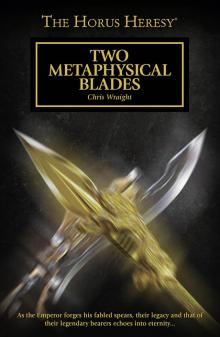 Two Metaphysical Blades
Two Metaphysical Blades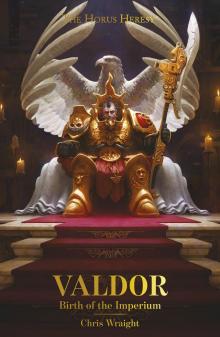 Valdor: Birth of the Imperium
Valdor: Birth of the Imperium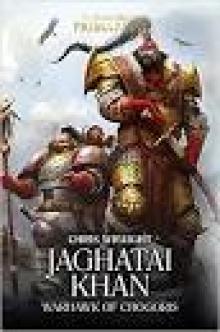 JAGHATAI KHAN WARHAWK OF CHOGORIS
JAGHATAI KHAN WARHAWK OF CHOGORIS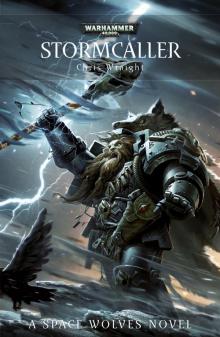 Stormcaller
Stormcaller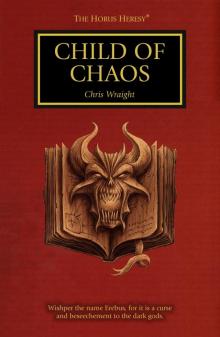 Child of Chaos
Child of Chaos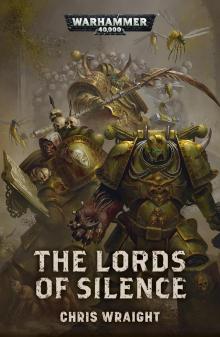 The Lords of Silence
The Lords of Silence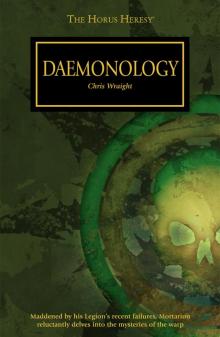 Daemonology
Daemonology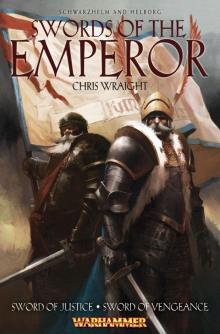 Swords of the Emperor
Swords of the Emperor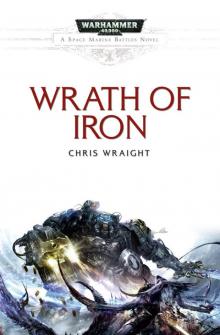 Wrath of Iron
Wrath of Iron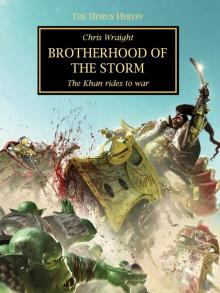 Brothers of the Storm
Brothers of the Storm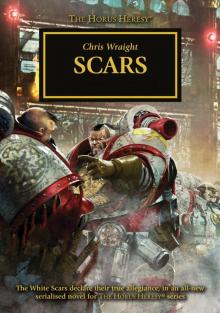 Horus Heresy: Scars
Horus Heresy: Scars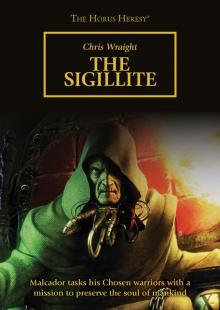 The Sigillite
The Sigillite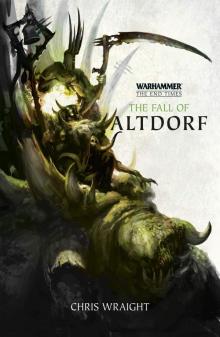 The End Times | The Fall of Altdorf
The End Times | The Fall of Altdorf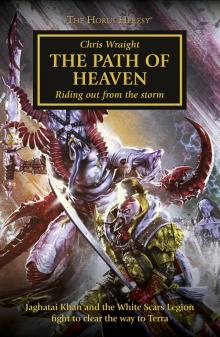 The Path of Heaven
The Path of Heaven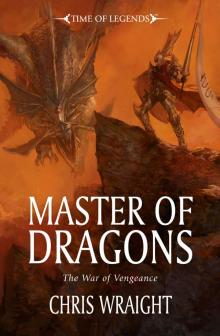 Master of Dragons
Master of Dragons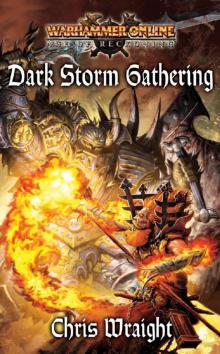 WH-Warhammer Online-Age of Reckoning 02(R)-Dark Storm Gathering
WH-Warhammer Online-Age of Reckoning 02(R)-Dark Storm Gathering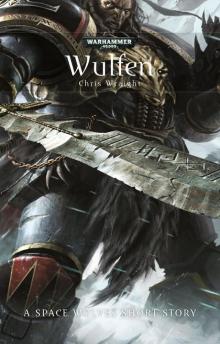 Wulfen
Wulfen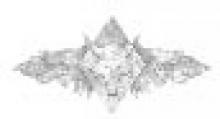 Battle Of The Fang
Battle Of The Fang Onyx
Onyx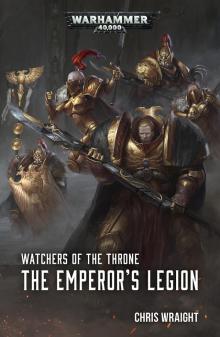 Watchers of the Throne: The Emperor’s Legion
Watchers of the Throne: The Emperor’s Legion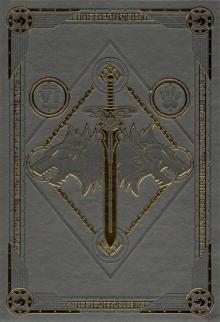 Leman Russ: The Great Wolf
Leman Russ: The Great Wolf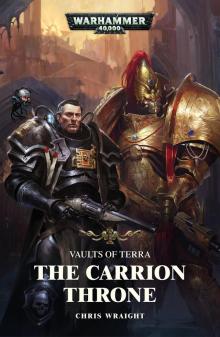 Vaults of Terra: The Carrion Throne
Vaults of Terra: The Carrion Throne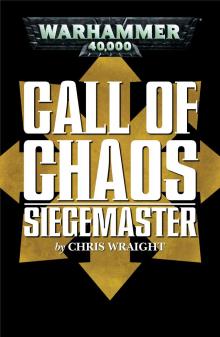 Siegemaster
Siegemaster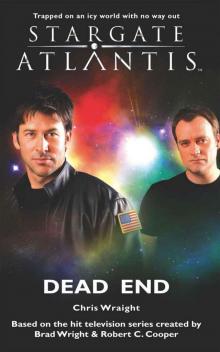 STARGATE ATLANTIS: Dead End
STARGATE ATLANTIS: Dead End Scars
Scars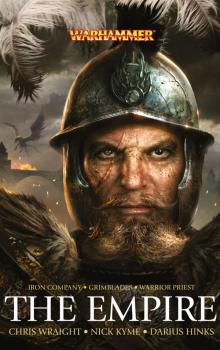 The Empire Omnibus
The Empire Omnibus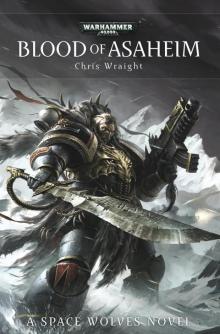 Blood of Asaheim
Blood of Asaheim